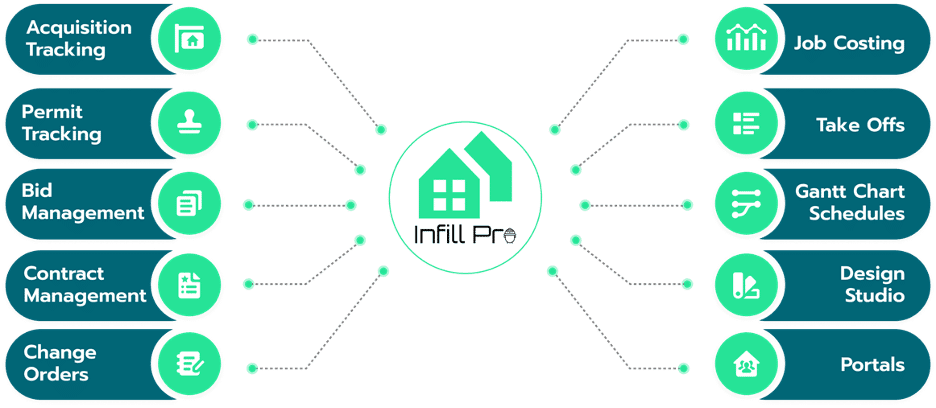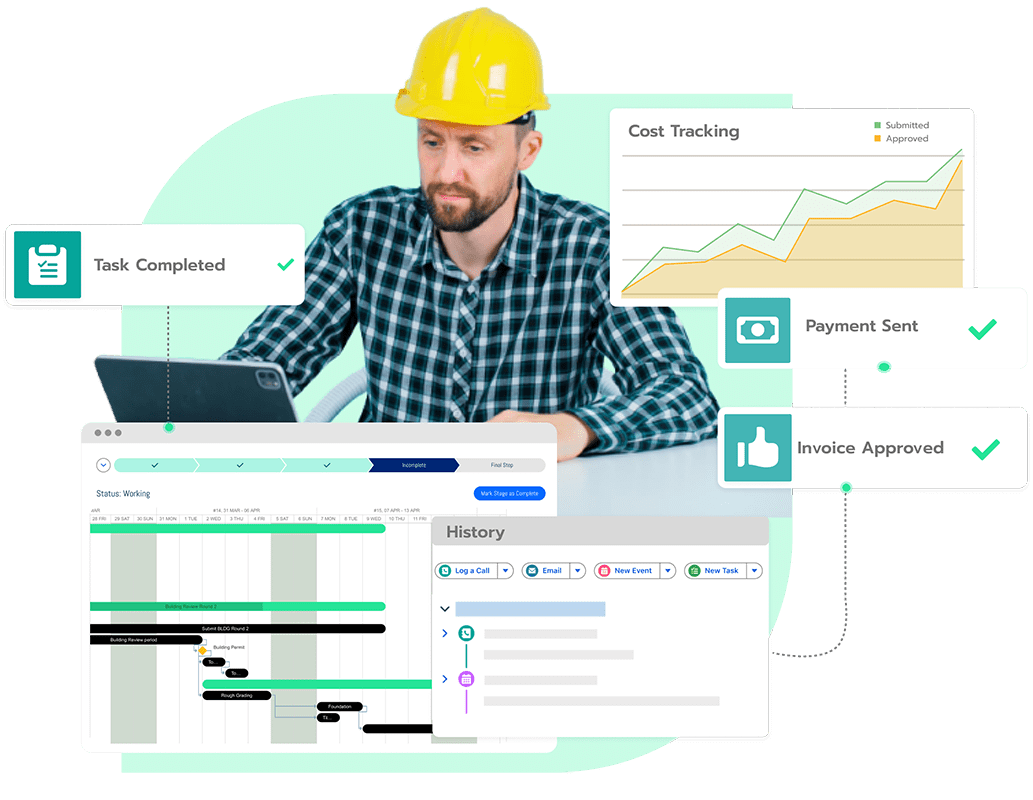Just Build.
Automate the Busy Work!
Infill.io’s unified platform revolutionizes construction management by streamlining the process of managing multiple projects. Our solution consolidates your construction and acquisition workflows, eliminating the chaos of spreadsheets and disconnected systems. Enhance efficiency, reduce risks, and keep every project on track with a comprehensive approach to project management that adapts to your business needs.
Increase in Employee Productivity
Faster Reporting from Centralized Data
Faster, Smarter Decision-Making
Improved Customer Experience
The Challenge of Managing Multiple Projects
Scaling Up Shouldn't Mean Losing Control.
Managing multiple construction projects—especially in dense urban environments—presents unique construction management challenges. Each site operates with its own schedule, budget, and countless moving parts. Without the right construction management tools, tracking progress across multiple locations can quickly become overwhelming.
Disconnected Tools
You’re juggling spreadsheets, email threads, and outdated systems that don’t communicate with each other.
Lack of Visibility
Important project risks and delays often go unnoticed until it’s too late.
Missed Deadlines and Budgets
Managing schedules and costs across multiple sites is nearly impossible without streamlined processes.
Wasted Time on Repetition
Hours are lost to updating spreadsheets, compiling reports, and chasing down updates.
The Solution: Build Smarter with Infill Pro
Your Unified Platform for Effortless Multi-Project Management.
Infill Pro was built to tackle the challenges of managing multiple projects head-on. By consolidating all your construction and acquisition processes into one powerful platform, we help builders scale operations without the headaches of disconnected tools and manual spreadsheets.
Here’s how we simplify and supercharge your project management:

Data Centralization
All Your Project Information in One Place
Stop juggling spreadsheets and scattered systems. Infill Pro brings your data into a single, unified platform so you have full visibility into every stage of every project, from acquisition to warranty, at any time.
Automate Your Processes
Streamline your operations by automating routine tasks. Reduce manual effort, minimize errors, and free up your team to focus on what truly matters—building and revitalizing urban communities.


Custom Reporting & Dashboards
Generate tailored reports and interactive dashboards that provide actionable insights at a glance, such as identifying projects at risk due to budget overruns, schedule delays, or resource constraints. Empower your team with the data they need to make informed decisions—without sifting through endless spreadsheets.
Embark on your Project Management
AI Journey
Interact with your project data using Gen AI tools. Quickly find records, summarize data, and generate actionable plans with intuitive, low-code/no-code solutions.
Find Records Easily
Have you ever wanted to figure out which projects are closing this quarter but dont have the report or want to dig through excel sheets with filters.
Get Project Summaries
Get customizable project summaries generated by AI. Use templates to pull all the information relevant to you from your projects schedule data, budget data, risk indexes, underwriting information, etc.
Testimonials
what clients say about us
Infill Pro has been developed by people who understand the construction and project management business. John and his team bring unique insights into how you can harness the power of Salesforce to leverage the data that flows through your company. Experienced, reliable and easy to work with, I would highly recommend Infill Pro to anyone considering ways to improve their construction or real estate related company through software.
As an infill developer, it's been difficult (if not frustrating) to find a project management software to check the box for all of our needs. John and his team developed a system for us that improves cost controls, integrates with accounting, provides excellent executive level reporting, and provides for direct communication with clients and vendors. All while providing excellent customer service and attention to our needs. I highly recommend Infill Pro if you're looking to upgrade to a better platform and improve the financial insights for your company.
Finding the right project management software solution has been a 10+ year journey for me. I have used multiple different solutions but features were always missing. Infill Pro has allowed me to see the business as a whole. The reporting features allow me to take a snap shot from the 30,000 foot level and then really focus on areas in need. John and his team understand home construction and have created a great product. I would highly recommend Infill Pro.
Had a great experience moving over from BuilderTrend to the SalesForce platform that Infill provided. Easy migration and very responsive team that helps every step of the way. Ease of use and streamlined efficiency through the report building. Highly recommended for anyone in the construction field looking to take the next step to growing their business.
The program combines many data base, computation, word processing and other functions to deliver powerful management tools tailored to our specific challenges. Infill.io excels in bringing together these tools to deliver a comprehensive management solution which that has meaningful impacts on profitability.
Take the Next Step Toward Financial Clarity
Infill Pro
Mastering Efficiency in Construction Management

Optimize every aspect of construction management with our comprehensive suite. Enjoy access to job costing, bid management, scheduling, and more, along with real-time profitability tracking, contingency risk index, and schedule milestone risk indexes. Our platform is tailored for enhanced project efficiency and precision.
Interested?
Ready to take the Next Step?
No matter your role—Developer, Contractor, Project Manager, or Investor—Infill Pro is designed to simplify construction management and enhance your business. Let’s talk about how we can help.
See How We Are Different!
85% of construction professionals Revert to Excel, spending hours on manual updates.

